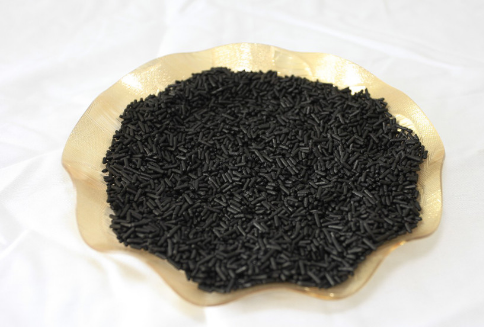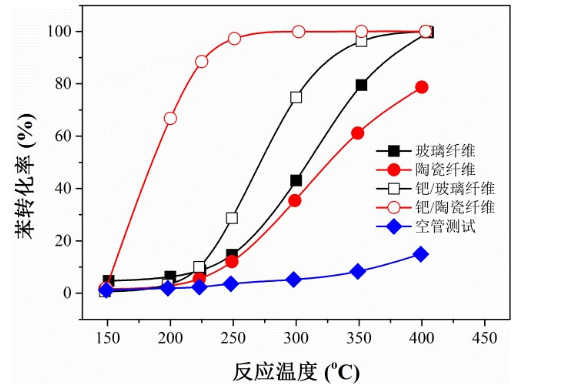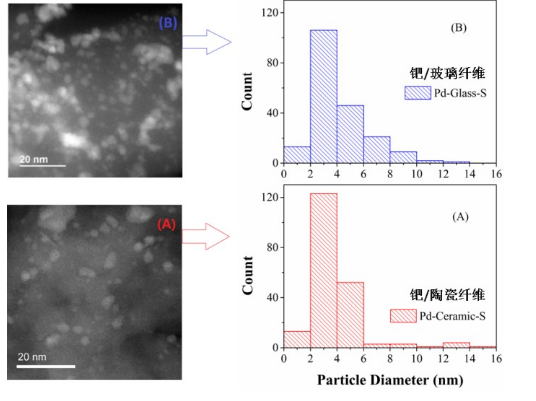On April 4, the reporter learned that the research team of He Hong from the Institute of Urban Environment of the Chinese Academy of Sciences has made progress in the research of catalytic combustion of VOCs. The research results are Palladium supported on low-surface-area fiber-based materials for catalytic oxidation of volatile organic compounds The topic was published in the academic journal Chemical Engineering Journal. In this study, a new type of catalyst was prepared by using fiber-based materials with good thermal stability, excellent mass and heat transfer performance as a carrier, and supporting precious metal palladium in different ways.

The results show that fiber-based materials with a positively low specific surface area can achieve high-efficiency dispersion of precious metals, and the ceramic fiber-based catalyst has the best activity for purifying benzene (Figure 1). The strong acidity of the carrier and the effective dispersion of precious metals are the keys to its excellent activity (Figure 2). Based on the advantages of fiber-based catalysts such as good mechanical strength, good mass transfer performance, and easy molding, it can be conveniently applied to catalytic combustion reactors of different shapes and sizes, saving application costs. The research results have applied for an invention patent, and follow-up research will focus on solving its mass production problems.
Projection
The precious metal palladium was successfully loaded on the low surface area fiber material.
The pd-ceramic fiber catalyst is an effective way to eliminate human voice.
Ceramic fiber is much better than glass fiber because it has higher pd particle dispersion and stronger supporting acidity.
Volatile organic compounds (VOCs) are one of the important precursors that aggravate the combined pollution of gas. According to the "Thirteenth Five-Year Plan Outline", total VOCs emissions in 2020 will be reduced by more than 10% compared with 2015. To achieve total emission reduction, it is urgent to increase the control of VOCs pollution. Catalytic combustion technology is one of the mainstream technologies to remove VOCs, and the most widely used catalyst is precious metal catalyst. The catalyst carrier can improve the dispersion of precious metals and change the chemical state of precious metals, which has a significant impact on the conversion activity and stability of VOCs. Traditional supports are mainly oxides such as Al2O3, SiO2, TiO2, etc., and emerging three-dimensional ordered pore materials such as Mn2O3 Co3O4 and porous molecular sieves such as Beta and SBA-15 have attracted more and more attention. Because VOCs combustion requires catalysts with excellent reaction activity, mass transfer, heat transfer performance and thermal stability, the development of new and efficient catalysts is the key to the application of this technology.
The fiber palladium catalyst was synthesized by ultrasonic-assisted dipping method on the ceramic and glass fiber support by leaching with water, sulfuric acid and nitric acid, respectively. Next, a benzene catalytic combustion test was carried out on the prepared catalyst. In terms of benzene conversion and carbon dioxide production, pd-ceramic fibers show better activity than pd-glass fibers, and 0.8 wt-pd loading is the optimal loading. The prepared catalysts include non-cis ratio, per ratio, xrd, xps, tem, in-situ drift agent and tpd. The results show that a relatively large surface area, strong supporting acidity, well-dispersed pd particles, and suitable redox and desorption properties all have a certain promotion effect on the good performance of the ceramic fiber-based catalyst. The results show that the PD-ceramic fiber catalyst is an effective method to remove volatile organic compounds.
This research was supported by the National Natural Science Foundation of China and the National Key Research and Development Program.

Progress has been made in the research of low surface area fiber-based palladium catalyst to remove VOCs in urban environment

Progress has been made in the research of low specific surface area fiber supported palladium catalyst for VOCs removal in Urban Environment Institute
Article source: Urban Environment Research Institute
Original link: https://www.xianjichina.com/special/detail_393529.html
Source: Xianji.com
The copyright belongs to the author. For commercial reprints, please contact the author for authorization. For non-commercial reprints, please indicate the source.